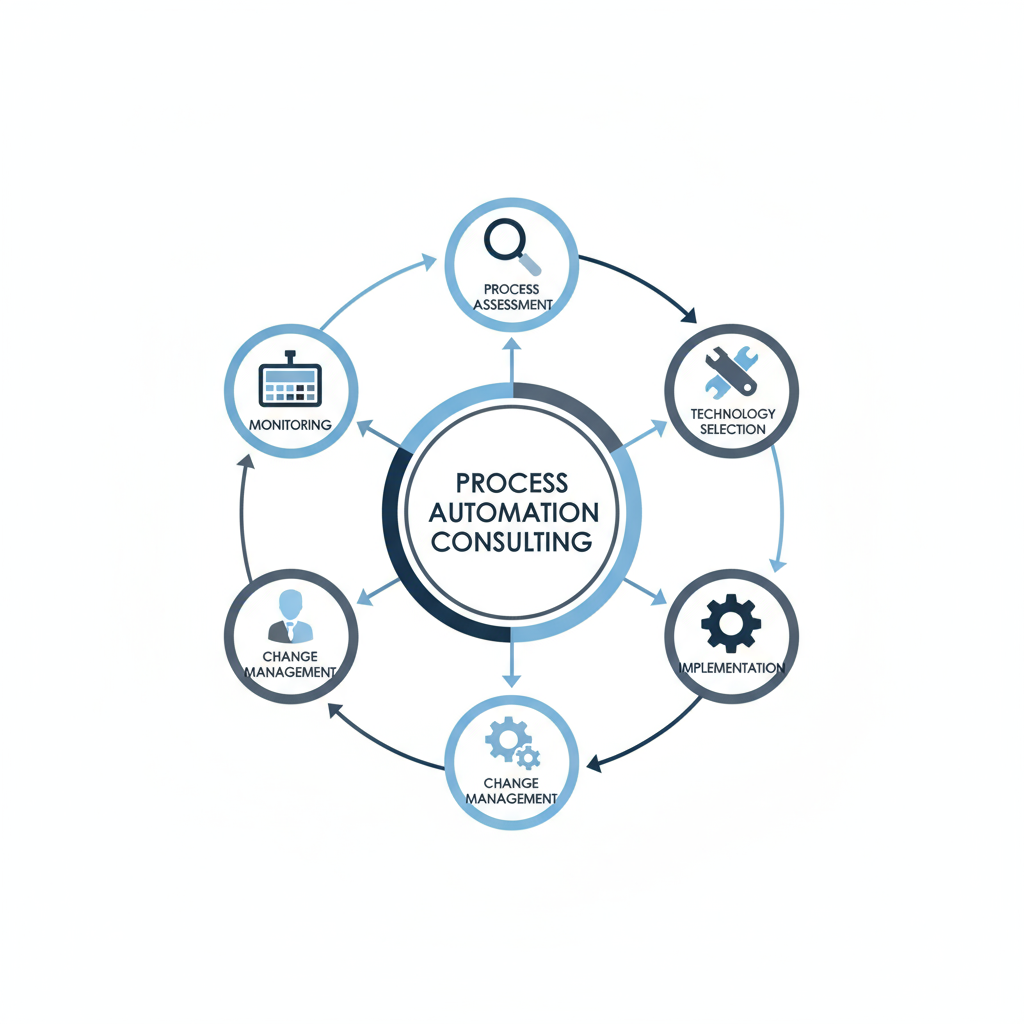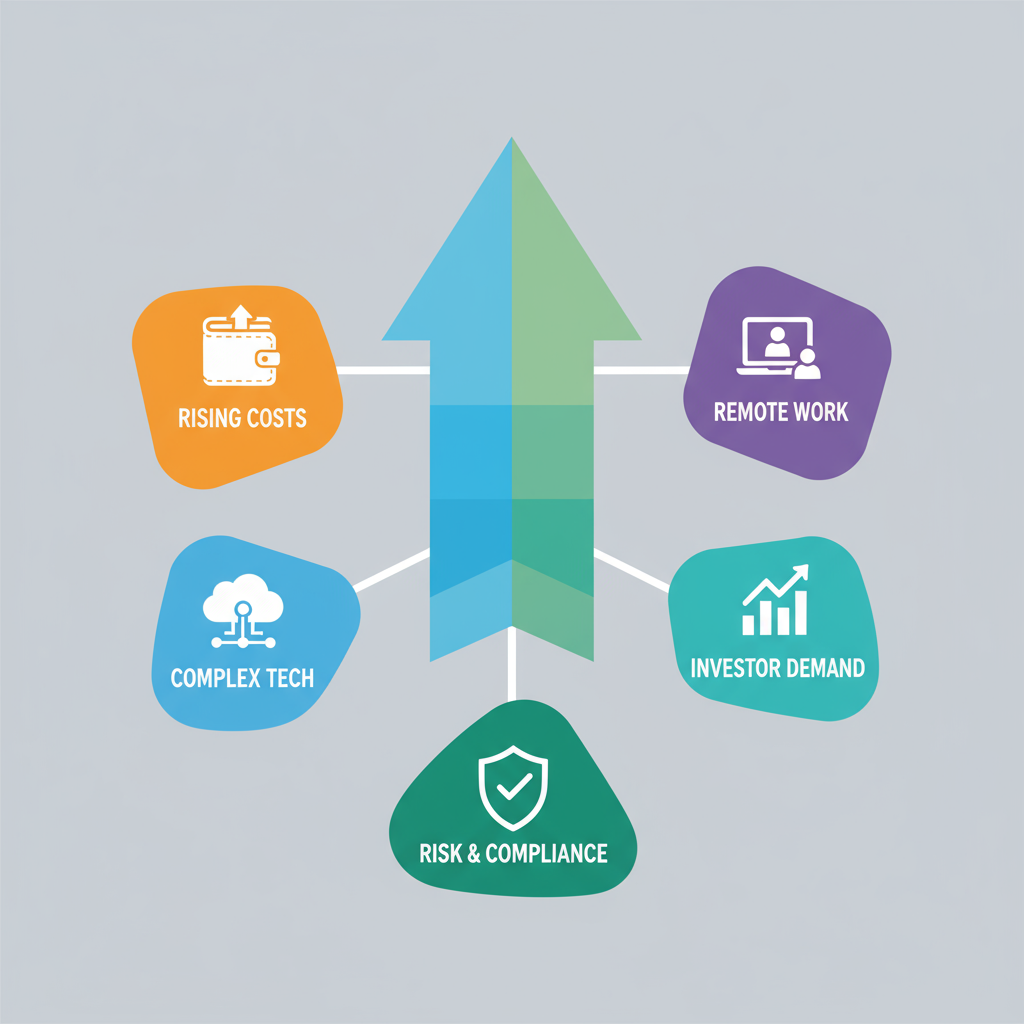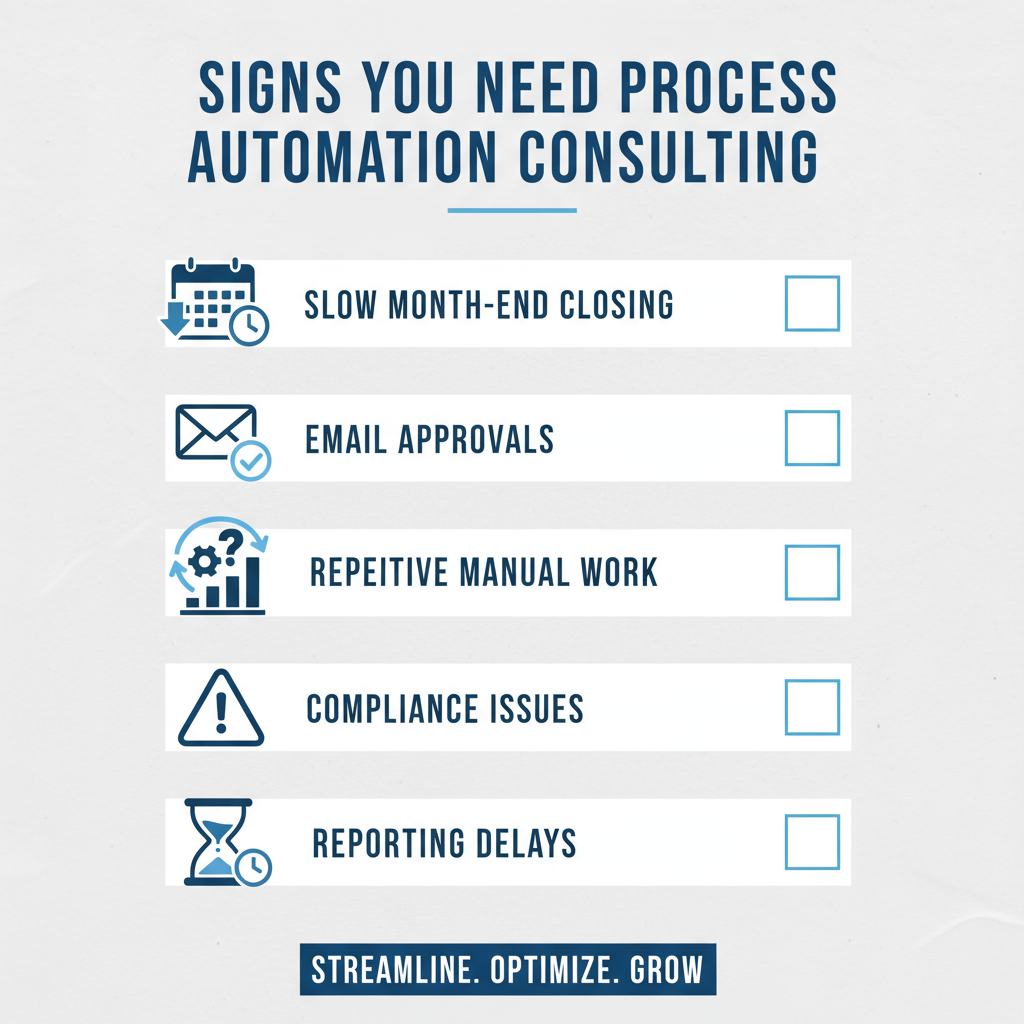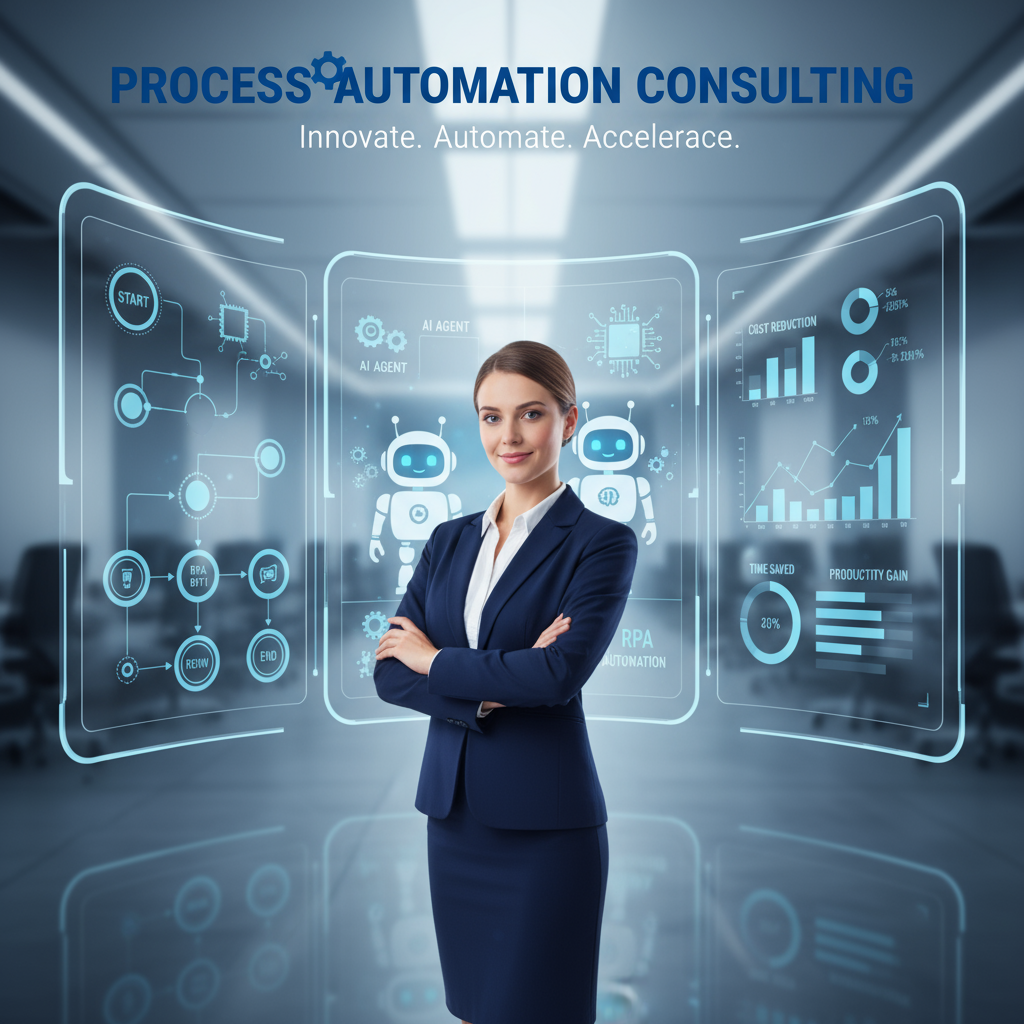Summary
In today’s hyper-digital business world, efficiency is no longer a competitive advantage — it’s a necessity. Manual processes, spreadsheets, and fragmented workflows quietly erode productivity and profit. For growing businesses, this can be the difference between scaling successfully and stagnating.
That’s where process automation consulting steps in. By combining strategy, technology, and change management, automation consultants help organizations streamline operations, reduce costs, and scale smarter.
This guide explains everything you need to know about business process automation consulting in 2025 — what it is, how it works, its benefits, common challenges, and why it’s becoming a cornerstone of modern business strategy.
Manual operations are a silent killer of growth. Repetitive data entry, email-based approvals, and disconnected spreadsheets waste 30–40% of employee time in most organizations.
For startups and SMEs, that lost time translates into missed revenue opportunities, delayed decisions, and higher operating costs. As markets become more competitive and investors demand leaner operations, companies can no longer afford inefficiency.
Process automation consulting goes far beyond just buying software. It’s a structured, strategic approach to redesigning business workflows, eliminating bottlenecks, and creating data-driven, scalable systems that grow with your business.
What Is Process Automation Consulting?

Process automation consulting is the structured practice of analyzing, redesigning, and digitizing workflows using automation technologies to improve efficiency, accuracy, and scalability.
Rather than simply “installing tools,” automation consultants help organizations understand how work happens — and then reimagine how it should happen.
A process automation consultant typically helps businesses:
- Map workflows across finance, HR, sales, operations, and compliance.
- Identify inefficiencies and process bottlenecks.
- Select the right automation stack (RPA, BPM, AI, APIs, or ERP integrations).
- Design and implement improved workflows that align with business objectives.
- Ensure adoption and governance, so automation delivers measurable ROI.
In essence, process automation consulting combines strategy, technology, and people enablement to build more efficient, resilient organizations.
Why Process Automation Is Surging in 2025

Automation isn’t a future trend — it’s a 2025 reality. Companies across industries are embracing automation consulting for several reasons:
Also Read:Key Difference Between an Advisory Board and Board of Directors
1. Rising Cost Pressures
With inflation and wage growth increasing operating costs, automation offers a practical solution. Businesses adopting workflow automation typically achieve 20–50% cost reductions in back-office operations.
2. Complex Technology Landscape
With hundreds of automation tools available (RPA, AI, iPaaS, BPM, etc.), businesses need expert guidance to avoid overcomplicating systems or selecting the wrong platforms.
3. Remote & Hybrid Work Environments
Distributed teams require digitally connected, auditable workflows that maintain visibility, compliance, and accountability.
4. Investor Expectations
Private equity and venture capital investors now demand automation maturity as a key indicator of operational efficiency and scalability.
5. Risk & Compliance Management
Manual workflows are prone to human error, fraud, and non-compliance. Automation ensures standardized, traceable, and auditable operations — reducing business risks significantly.
Core Responsibilities of a Process Automation Consultant
A process automation consultant wears many hats — strategist, technologist, and change manager. Their responsibilities typically include:
1. Process Assessment & Opportunity Identification
They begin by analyzing existing workflows and identifying areas with inefficiencies, repetitive tasks, or potential automation opportunities.
2. Solution Design & Tech Selection
Once the gaps are identified, the consultant designs an automation framework, selecting the best-fit technologies such as:
- RPA (Robotic Process Automation) for repetitive digital tasks.
- BPM (Business Process Management) for end-to-end workflow orchestration.
- APIs & iPaaS tools for system integrations.
- AI/ML for predictive insights and intelligent decision-making.
3. Implementation & Integration
Consultants oversee system deployment, integration with existing tools (like ERP, CRM, or HRMS), and establish new automation workflows.
4. Change Management & Training
They ensure employees understand and adopt new systems through workshops, training, and communication frameworks.
5. Monitoring & Optimization
Automation isn’t a one-time project — it’s a continuous improvement journey. Consultants help monitor KPIs, track adoption, and optimize performance over time.
Key Areas Where Automation Consulting Adds Value
Automation consulting can be applied across multiple departments and functions. Here are some high-impact areas:
1. Finance & Accounting
- Automating accounts payable and receivable workflows.
- Reconciliation and month-end closing.
- Real-time financial dashboards and reporting.
- Cash flow forecasting integrated with ERP systems.
2. Human Resources & Payroll
- Employee onboarding and offboarding workflows.
- Leave approvals and payroll automation.
- Compliance tracking across different locations.
3. Sales & Marketing
- CRM automation (HubSpot, Salesforce).
- Lead qualification and nurturing workflows.
- Marketing analytics and campaign reporting.
4. Operations & Supply Chain
- Order-to-cash and procure-to-pay automation.
- Inventory and logistics visibility.
- Vendor management and IoT-enabled tracking.
5. Compliance & Risk Management
- Automated compliance calendars and reporting.
- Document tracking and audit trail creation.
- Risk monitoring dashboards for management and regulators.
Real-world example: A mid-sized retail company reduced invoice processing time by 70% using RPA bots combined with AI-powered OCR systems — all implemented under expert workflow automation consulting.
DIY Automation vs. Process Automation Consulting
| Aspect | DIY Automation | Process Automation Consulting |
| Approach | Tool-centric | Strategy & outcome-driven |
| Implementation | Fragmented, limited scope | Enterprise-wide process redesign |
| Change Management | Usually missing | Structured adoption plan |
| Scalability | Limited | Scalable, governance-driven |
| Results | Patchy ROI | Sustainable, measurable results |
Many companies start automation on their own but struggle to sustain it. Process automation consultants bring the cross-functional expertise, governance models, and adoption frameworks necessary for success.
Workflow Automation Consulting Framework
Most workflow automation consulting engagements follow a structured framework:
- Discovery & Assessment – Audit existing processes, map workflows, and quantify inefficiencies.
- Prioritization & Business Case – Identify high-impact areas using effort vs. benefit analysis.
- Design & Technology Alignment – Choose the right automation technologies (RPA, AI, APIs).
- Implementation & Testing – Build, test, and deploy automated processes with minimal disruption.
- Change Management – Communicate change, train staff, and manage adoption.
- Optimization & Scale-Up – Measure success and replicate automation across departments.
This ensures automation efforts are systematic, sustainable, and business-aligned — not just another IT project.
Technology Landscape in Process Automation
Automation consultants use a mix of cutting-edge technologies to create seamless digital ecosystems:
- Robotic Process Automation (RPA): For rule-based, repetitive digital tasks.
- Business Process Management (BPM): To orchestrate complex end-to-end workflows.
- iPaaS (Integration Platform as a Service): To connect disparate software systems through APIs.
- Optical Character Recognition (OCR): To extract data from physical or scanned documents.
- AI & Machine Learning: For intelligent routing, prediction, and anomaly detection.
- Low-Code / No-Code Platforms: To enable citizen developers within teams.
The key is alignment — ensuring the chosen tech stack fits your business needs and existing infrastructure.
Measuring ROI of Process Automation Consulting
The success of any automation process consulting engagement depends on tangible outcomes. Common ROI metrics include:
- 30–40% reduction in process cycle times.
- 25–50% cost reduction in operations.
- 40–60% decrease in manual errors.
- 2–3x improvement in process scalability.
However, ROI is not just about savings — it’s about speed, accuracy, compliance, and better decision-making. Automation gives leaders real-time visibility into performance, enabling smarter business choices.
Signs Your Company Needs a Process Automation Consultant

Not sure if it’s time to bring in an automation consultant? Here are key warning signs:
- Month-end closing takes more than 10 days.
- Approvals rely heavily on emails or spreadsheets.
- Employees spend 20%+ of their time on repetitive manual work.
- You lack real-time visibility into key business KPIs.
- Frequent compliance or audit issues occur.
- Investor or board reporting is delayed due to data gaps.
If two or more of these sound familiar, it’s time to explore business process automation consulting.
Common Pitfalls to Avoid
Even the best automation projects can fail if not executed correctly. Avoid these mistakes:
- Automating broken or outdated processes.
- Choosing tools before defining goals.
- Ignoring change management and employee training.
- Failing to measure post-implementation performance.
- Skipping governance and compliance reviews.
Successful automation requires strategy, stakeholder buy-in, and continuous improvement.
How to Choose the Right Process Automation Consultant
Selecting the right consulting partner can make or break your automation initiative. Look for:
- Cross-industry experience: They should understand your business model and industry regulations.
- Technical expertise: Proven experience with RPA, BPM, API integrations, and AI.
- Change management skills: Ability to train teams and ensure adoption.
- Proven results: Case studies showing measurable ROI and operational improvements.
- Transparent communication: Clear project scope, KPIs, and timelines.
The right consultant will align automation with your strategic business goals, not just your IT needs.
Readiness Checklist for Businesses
Before engaging a consultant, ensure you’re prepared:
- ✅ Defined business objectives for automation.
- ✅ Executive sponsorship and budget approval.
- ✅ Process owners assigned for key workflows.
- ✅ Baseline metrics to measure improvements.
- ✅ Willingness to embrace operational change.
Being prepared ensures your consulting engagement delivers rapid and lasting value.
Future of Process Automation Consulting
The future of automation consulting lies in intelligent automation — where AI, analytics, and automation converge.
Trends to watch:
- AI-driven process discovery to identify automation opportunities automatically.
- Predictive automation using machine learning models.
- Hyperautomation ecosystems combining RPA, BPM, and AI for holistic workflow transformation.
- Citizen automation — empowering non-technical employees to build automations securely.
In 2025 and beyond, process automation consulting will continue to evolve from cost optimization to strategic value creation.
FAQs
What is the role of a process automation consultant?
They analyze business workflows, identify automation opportunities, select suitable tools, implement solutions, and train teams to ensure adoption and ROI.
How is business process automation consulting different from IT consulting?
IT consulting focuses on technology deployment. Process automation consulting focuses on redesigning workflows, aligning tech with business outcomes, and driving adoption.
What tools are commonly used in workflow automation consulting?
Tools include UiPath, Blue Prism, Microsoft Power Automate, Zapier, and custom-built APIs.
How long does automation implementation take?
Small projects can take 6–8 weeks; large-scale enterprise transformations may span 3–9 months.
Is process automation consulting only for large enterprises?
No. Startups and SMEs benefit equally — especially those scaling fast with limited teams and resources.
What kind of ROI can businesses expect?
Typically, businesses achieve ROI within 6–12 months, with 30–40% productivity gains and long-term cost reductions.
What are the biggest challenges in automation adoption?
Resistance to change, lack of governance, and insufficient training are the most common hurdles. Effective consultants mitigate these through structured change management.
Conclusion
In 2025, the competitive edge doesn’t belong to the company with the largest team — it belongs to the company with the most efficient processes.
Process automation consulting ensures your organization doesn’t just digitize inefficiency but re-engineers workflows for scalability, accuracy, and compliance.
Whether you’re a startup aiming for operational excellence or an established enterprise looking to scale sustainably, investing in business process automation consulting is no longer optional — it’s essential for future-ready growth.
Automation doesn’t replace people. It amplifies human potential — freeing teams to focus on innovation, creativity, and strategic value creation.
If you’re serious about growth, the question isn’t whether you need a process automation consultant — it’s how soon you can bring one onboard.
I’m Debabrata Behera, a passionate blogger sharing insights, tips, and stories across diverse topics. Through my writing, I aim to inspire, inform, and connect with readers worldwide.

